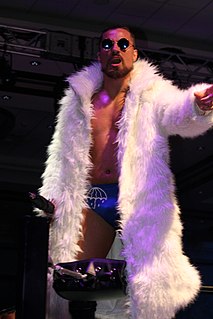A Quote by Edward Zwick
I'm always interested in the ways in which a character can inhabit either a theme or a premise personally, so that those scenes that are about his character or his relationship with other characters feel in context and don't seem to be apart from or oddly vestigial to the actual drama.
Related Quotes
I very easily decide in certain situations that I'm an outsider. That's just my own craziness. I think that I have sympathy for those characters who are like that, but I love it when the humor comes from a character who is serious about his situation - only the way he's thinking about it is all wrong, or the ways he's solving his problems are never going to work.
It is the grandeur of Christ's character which constitutes the chief power of His ministry, not His miracles or teachings apart from His character. The greatest triumph of the Gospel is Christ Himself--a human body become the organ of the Divine nature, and revealing, under the conditions of an earthly life, the glory of God.
When something arrives, you have no idea what's in it, which is good. And then, it's is the story leaps off the page at you and how your character functions within it. There could be just one scene and if it's wonderful, it doesn't matter how much you're working on it because you just want to be in it. It's really about what your character's day to day world looks like, and if you feel like that's something that's complete, and that you'd like to inhabit for awhile. You'll know by a couple of scenes in. If the character grabs you, you run with it.
The moral absolutes rest upon God's character. The moral commands He has given to men are an expression of His character. Men as created in His image are to live by choice on the basis of what God is. The standards of morality are determined by what conforms to His character, while those things which do not conform are immoral.
Even though Lyndon Johnson's presidency was in many ways scarred forever by the war in Vietnam, and destroyed in a lot of ways, he - as a character - was even larger than his presidency. Being able to get to know him well, that firsthand relationship with this large character, I think is what drew me to writing books about presidents.
A character does seem to have a life of its own, but I have what I'd describe as a very fluid relationship with them - as I'm thinking of what they will be like, they shift in and out of focus - they are a projection of some idea inside of me, even if a character is inspired by an actual person, I'm well aware that it is not that person. My job is to identify the essence of the character, and to bring them to life long enough to commit the acts, say the words or simply "be" in a way that allows them to affect and be affected by other elements and events in the imaginary world of a story.
I think there's always pieces of yourself that bleed into your character. That's inevitable. In some ways, we have similarities, but in other ways, we're completely different. It's hard to say because I'm an actor living in a world where we're all pretty privileged, and this guy is fighting for his life. They're very different circumstances. Within those circumstances, there are probably ways that we react to certain situations that are similar.





































